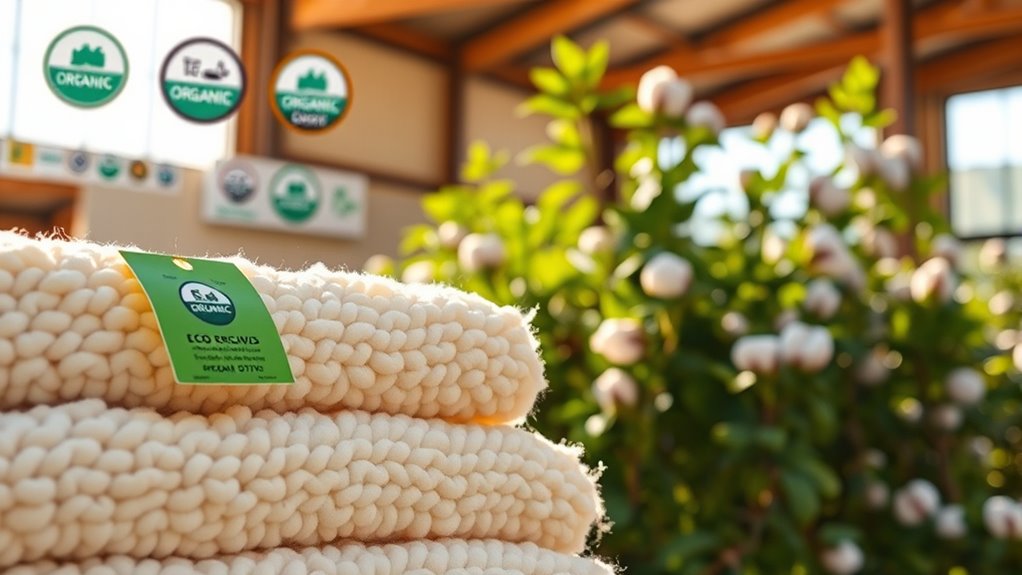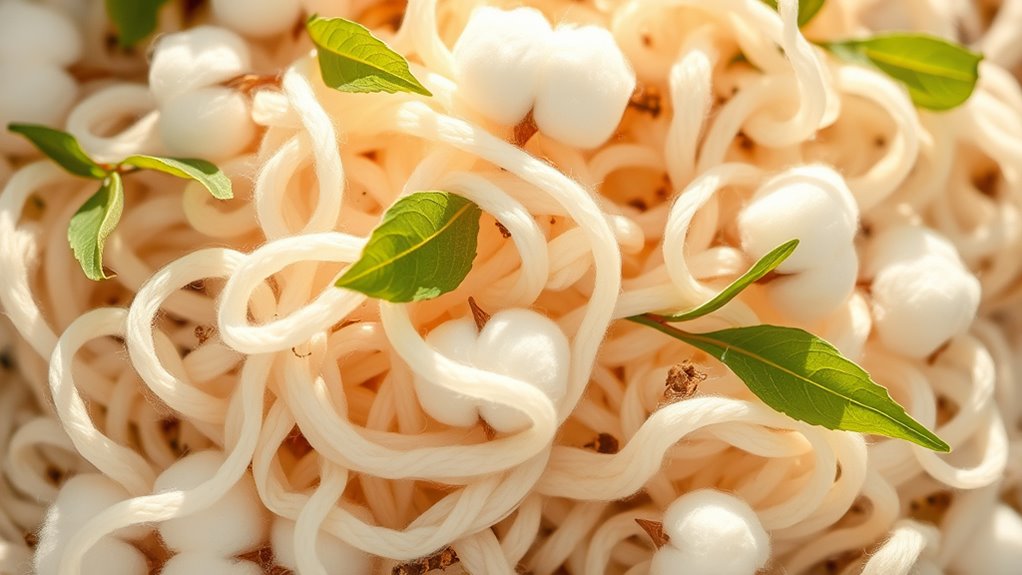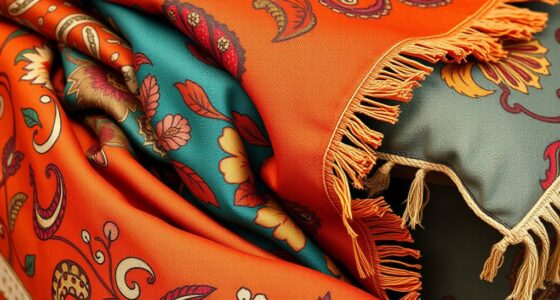Choosing certified organic cotton means you’re supporting sustainable farming that protects the environment and guarantees fair labor practices. Certifications like GOTS and OCS verify that the cotton is grown without synthetic chemicals, promotes biodiversity, and follows strict social standards. These labels help you make responsible purchases and encourage eco-friendly practices worldwide. If you want to understand how these certifications work and what they guarantee, keep exploring to discover the full picture.
Key Takeaways
- Certifications like GOTS and OCS verify organic cultivation and transparency, ensuring authenticity of organic cotton products.
- GOTS certification confirms chemical-free farming and social responsibility standards, including fair wages and safe working conditions.
- OCS tracks the organic fiber from farm to finished product, providing traceability and trust in the supply chain.
- Certified organic cotton minimizes environmental harm by reducing chemical use, supporting soil health, and promoting sustainable practices.
- Choosing certified organic cotton aligns with eco-friendly values and supports responsible farming and fair labor practices globally.

Choosing organic cotton is a simple yet impactful step you can take to support sustainable fashion and reduce environmental harm. When you opt for products made from organic cotton, you’re endorsing farming practices that prioritize the health of the planet, farmers, and communities. Unlike conventional cotton, which relies heavily on synthetic chemicals and fertilizers, organic cotton is grown through sustainable farming methods that minimize environmental impact. This means no toxic pesticides or synthetic fertilizers are used, reducing soil and water pollution and promoting biodiversity. By choosing organic, you’re helping to preserve ecosystems and ensure that farming remains viable for future generations.
Understanding the certifications behind organic cotton helps you make informed decisions. Certifications serve as verified proof that the cotton you’re buying truly adheres to sustainable farming practices. For example, the Global Organic Textile Standard (GOTS) is one of the most recognized certifications. It ensures that the cotton is grown without synthetic pesticides and fertilizers, and that social and environmental criteria are met throughout the supply chain. GOTS also requires that workers receive fair wages and work in safe conditions, further supporting sustainable farming communities. Similarly, the Organic Content Standard (OCS) tracks the organic fiber from field to finished product, providing transparency about the origin and handling of the cotton. When you see these labels, you can be confident that your purchase aligns with environmental and social responsibility.
Certifications like GOTS and OCS verify that organic cotton meets strict environmental and social standards.
Choosing certified organic cotton not only reduces your environmental impact but also encourages sustainable farming practices globally. These standards ensure that farmers avoid harmful chemicals that can degrade soil health and contaminate water sources. Instead, organic farmers use crop rotation, composting, and natural pest management techniques to maintain soil fertility and control pests. These practices promote long-term soil health, which is essential for sustainable farming and climate resilience. Additionally, adopting organic practices can lead to improved soil quality and increased biodiversity on farms. By supporting organic cotton, you’re contributing to a shift away from the harmful practices of conventional farming, encouraging more sustainable land use and resource conservation.
Ultimately, selecting products made from certified organic cotton is a conscious choice that aligns your values with your purchasing power. It’s a way to support sustainable farming and reduce the environmental impact associated with traditional cotton cultivation. When you look for trusted certifications, you’re helping to build a market that values ecological balance, fair labor practices, and responsible resource management. In doing so, you’re not just making a fashion statement—you’re advocating for a healthier planet and a more equitable future for everyone involved in the cotton supply chain.
Frequently Asked Questions
How Can I Verify Organic Cotton Certifications in Stores?
When verifying organic cotton certifications in stores, you should start with certification verification by asking store staff for proof. Don’t hesitate to make store inquiries about the certification details, such as labels or tags. Check for reliable certification logos like GOTS or USDA Organic, and ask for documentation if needed. This guarantees you’re getting authentic organic cotton and helps you make informed, eco-friendly choices confidently.
Do Organic Cotton Certifications Ensure Fair Labor Practices?
Think of organic cotton certifications as a sturdy bridge supporting fair labor practices. While they set standards through the Certification process, they don’t guarantee fair labor on their own. You’ve gotta look for additional signs, like fair trade labels, to verify workers are treated ethically. Certification helps, but it’s not a full guarantee—stay informed and ask questions to truly support fair labor.
Are There Eco-Friendly Dyes Used With Certified Organic Cotton?
You’ll find that eco-friendly dyes and natural coloring are often used with certified organic cotton, making your choices more sustainable. These dyes avoid harmful chemicals, reducing environmental impact and supporting healthier ecosystems. When you select organic cotton with eco-friendly dyes, you’re choosing products that promote safer manufacturing processes and lower pollution. This way, your fashion choices help protect the planet while enjoying vibrant, natural colors without risking your health or the environment.
How Does Organic Cotton Compare in Durability to Conventional Cotton?
You’ll find that organic cotton generally offers comparable fiber longevity and material strength to conventional cotton. While some worry about durability, organic options are often just as resilient, thanks to their natural fibers and minimal chemical processing. Proper care enhances durability, so you can enjoy your organic cotton items for a long time. Overall, organic cotton holds up well, providing reliable performance without sacrificing strength or longevity.
What Are the Environmental Benefits of Choosing Organic Cotton?
Imagine planting hope in the earth—choosing organic cotton does just that. You support sustainable farming practices that nurture the soil and protect ecosystems. Organic cotton requires less water, conserving essential resources and reducing pollution. By making this choice, you help minimize chemical runoff and promote biodiversity. It’s like giving back to the planet, ensuring cleaner air, water, and healthier communities for generations to come.
Conclusion
When you choose organic cotton with trusted certifications, you’re making a positive impact on the environment and supporting fair labor practices. Imagine buying a T-shirt stamped with GOTS — knowing it’s produced sustainably and ethically. By understanding these labels, you confirm your choices align with your values. So next time you shop, look for those key certifications and feel confident your purchase helps protect our planet and its people. Your mindful choice truly makes a difference.









